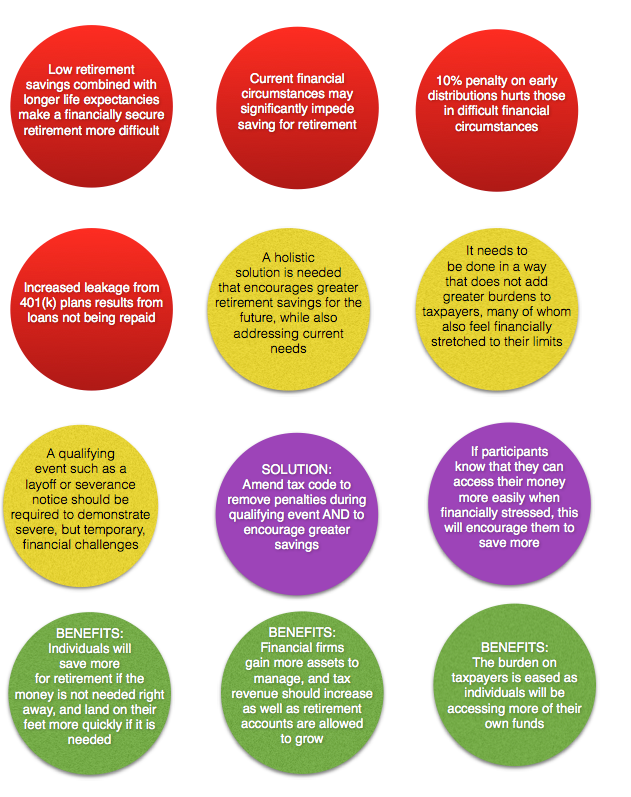 We cannot ignore the present when saving for the future. Likewise, we cannot ignore the future when dealing with the present. A recurring theme on this blog has been that people do want to do a good job in saving for retirement, but there are major obstacles into making this vision a reality. Two recent studies seem to concur with this hypothesis. The Investment Company Institute (ICI) reports that workers do in fact value their defined contribution/401(k) plans and the related tax-deferral advantages, even for those who are not contributing. HSBC points out that various life events play a significant role in interfering with the growth of retirement accounts. The ICI study, American Views on Defined Contribution Plan Saving. found that:
The HSBC report, The Future of Retirement - A Balancing Act - USA Report, meanwhile, points out a number of significant obstacles on the road to saving for retirement:
I think the remedy lies in finding the sweet spot of meeting the challenges of both today and tomorrow, rather than one to the exclusion of the other. Take a holistic approach to financial challenges, rather than observing them in a vacuum. Solutions also need to be politically acceptable to have any chance at success. I previously suggested one solution that I think might just work to address current financial challenges as well as long-term savings goals. The ICI report notes the importance of the tax incentive as it relates to retirement savings. What if we took this one step further and made the tax treatment even better. Various penalties under ERISA's tax provisions were well-intended, meant to help people save for retirement and to prevent them from wasting away their resources. So we have rules for too early (premature distributions), too late (age 70 1/2 rules), too little (minimum distributions), and too much (excess distributions). These were meant to protect individuals from themselves. In the case of the life events mentioned in the HSBC support, these penalties make a difficult situation even more challenging. My suggestion is simple - for verifiable financial distress, such as a layoff, allow access to retirement funds without penalty. The main benefit is that this will encourage greater retirement contributions in the first place as people will know that they will be able to access their funds when they need to. If the financial stress never occurs, then they will have saved even more for retirement. Here is a visual summary of my idea to make retirement saving less of a mirage and more of a rainbow:
0 Comments
As we start 2015, Baby Boomers born in 1950 will be reaching their 65th birthdays. Among celebrities, this includes Stevie Wonder, Bill Murray, Julius Erving, Arianna Huffington, Richard Branson, Jay Leno, Martin Short, Natalie Cole, and Steve Wozniak, among others. For the rest of the population who are not so famous, it is a time when large numbers will be retiring. For the remaining fourteen years in the Baby Boomer era (1946-1964), it is a time to assess where things stand. The Transamerica Center for Retirement Studies has done just that.
When most Baby Boomers started working, defined benefit plans were very popular, if not the norm. It wasn't until the early 1980's that 401(k) plans came into existence, although other types of defined contributions plans (such as profit-sharing plans) had been around for a long time. Those coming into the workforce afterwards have had more time to build their account balances. Transamerica reconfirmed that there is a retirement savings shortfall, and many Boomers are inadequately prepared for a long retirement. Equally as important, the study found that there is a disconnect between the expectations and the reality about working during retirement. According to Transamerica, roughly two-thirds of Baby Boomers plan to continue working past age 65, primarily for income or to retain health benefits. Some will continue working because they enjoy doing so. Most Boomers seek some sort of phased retirement, perhaps working reduced hours or in a different capacity. Nearly half of employers strongly agree that they are supportive of employees working past age 65. By contrast, only 1/4 of employees strongly agree that their employers are supportive. There is a similar disconnect in employees believing that employers will allow reduced roles. The study recommends that Boomers remain employable, but this may be easier said than done. Many employers have policies in place to ensure that they are an age-friendly workplace, but there is significant skepticism on the part of employees that these policy statements are actually supported. |
Blog Author - Ken FelsherWith over 25 years of writing, editing, and research experience. I enjoy sharing with my readers my love of working with content on a variety of subjects. CategoriesAll 401(k) 402(g) Boomers Catch-up DB Dc Deferral Limit Defined Benefit Defined Contribution ERISA Healthcare Participation Pension Professionally Managed RCS Retirement Retirement Confidence Tax Code Vanguard Women Working Archives
March 2015
|

